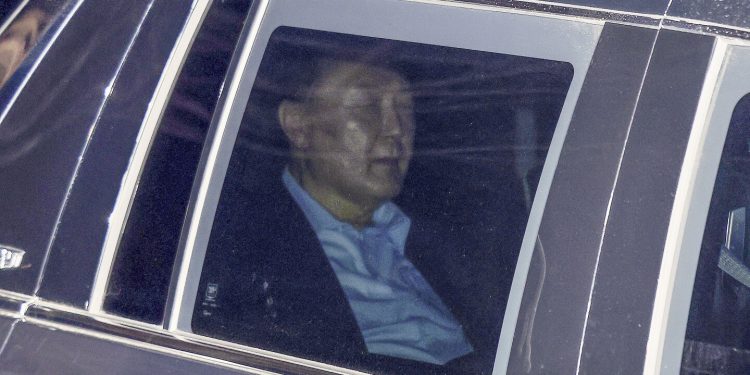SEOUL, South Korea (AP) — Lawyers representing South Korea’s deposed president said Thursday he will refuse further questioning after being arrested by anti-corruption officials following his ill-fated declaration of martial law on last month, saying the investigation is illegal.
President Yoon Suk Yeol exercised his right to remain silent while being questioned for more than 10 hours at the headquarters of the Senior Officials Corruption Investigation Bureau on Wednesday, following a massive operation by law enforcement to stop him at his official residence in Seoul.
Investigators are expected to arrest him in the coming days.
The anti-graft agency, which is conducting a joint investigation with the police and military to determine whether Yoon’s identity declaration of martial law amounting to an attempted rebellion, has 48 hours either to ask the court to order his formal arrest or to release him.
Yoon’s lawyers argued that the detention warrant issued by the Seoul Western District Court was invalid and asked the Seoul Central District Court to consider his release. The deadline for issuing the arrest warrant is suspended while the court examines his request, which can take up to 48 hours.
On Thursday, his lawyers formally affirmed that Wednesday’s search of the presidential residence, which led to the arrest of a head of state, was illegal, as part of complaints filed with the prosecutor’s office.
Yoon did not attend a hearing at the Central District Court on Thursday, which was part of the review of his detention order, due to security concerns, according to Seok Dong-hyeon, one of the president’s lawyers.
The decision was expected to be made in the evening.
Hundreds of Yoon’s supporters gathered in the streets near the court amid a heavy police presence, waving banners and chanting slogans calling for his release.
Yoon sparked the country’s most serious political crisis since its democratization in the late 1980s when he attempted to break the legislative deadlock by declaring martial law and deploying troops around the National Assembly on 3 December. The impasse lasted only a few hours before lawmakers managed to break through the blockade and voted to lift the measure.
His presidential powers were suspended when the opposition-dominated assembly voted to impeach him on December 14, accusing him of rebellion. His fate now rests in the hands of the Constitutional Court, which has begun deliberating whether to formally remove Yoon from office or dismiss the charges and reinstate him.
Yoon and his allies have defied efforts to investigate his role in the December 3 chaos. He ignored requests to appear for questioning for weeks, staying at his official residence to avoid arrest as his lawyers fought back police, citing a law that protects the premises. potentially linked to military secrets derived from research without the consent of the person responsible – Yoon himself. They also said the anti-corruption agency had no legal authority to investigate the rebellion allegations.
Yoon also resisted an attempt to arrest him as presidential security barricaded the residence. He was eventually taken into custody after hundreds of anti-corruption investigators and police raided the presidential compound for about five hours. second attempt.
In a video message recorded shortly before being escorted to the anti-graft agency’s headquarters, Yoon lamented that “the rule of law has completely collapsed in this country.” He echoed his lawyers’ arguments that the anti-graft agency has no power to investigate his actions, but said he agreed to detention to prevent violence.
The Constitutional Court rejected a request from Yoon’s lawyers to postpone a hearing on his case scheduled for Thursday. It remains possible for Yoon to exercise his right to appear, even while in detention.
If a court issues a formal arrest warrant for Yoon, anti-corruption investigators can extend his detention for up to 20 days, during which time they will forward the case to public prosecutors for indictment.
If prosecutors indict Yoon on possible charges of rebellion and abuse of power, he could remain in custody until the court’s first ruling, which is usually issued within six months, said Park Sung-bae, a lawyer specializing in criminal law. Under South Korean law, the leader of a rebellion can face the death penalty or life in prison if convicted.


